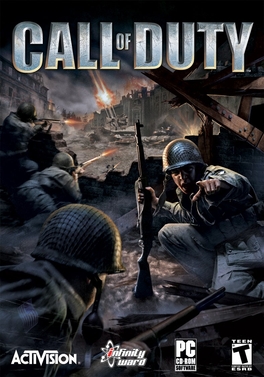
Call of Duty is a 2003 first-person shooter game developed by Infinity Ward and published by Activision. It is the first installment in the Call of Duty franchise, released on October 29, 2003, for Microsoft Windows. The game simulates infantry and combined arms warfare of World War II using a modified version of the id Tech 3 engine. Much of its theme and gameplay is similar to the Medal of Honor series; however, Call of Duty showcases multiple viewpoints staged in the American, British, and Soviet campaigns of World War II in Europe.

Excitebike is a motocross racing video game developed and published by Nintendo. In Japan, it was released for the Famicom in 1984 and then ported to arcades as VS. Excitebike for the Nintendo VS. System later that year. In North America, it was initially released for arcades in 1985 and then as a launch game for the Nintendo Entertainment System later that year, becoming one of the best-selling games on the console. It is the first game in the Excite series.

Excitebike 64 is a video game published by Nintendo and developed by Left Field Productions. It was released for the Nintendo 64 on May 2, 2000 in North America, June 23 in Japan, and June 8, 2001, in Europe. It is the second installment in the Excite series, acting as a sequel to Excitebike on the NES, and is the first 3D game in the series. Many real-life dirt bike gear brands are extensively featured throughout the game, such as Bell Helmets, Alpinestars and No Fear.

Metal Gear Solid 3: Snake Eater is a 2004 action-adventure stealth video game developed and published by Konami for the PlayStation 2. It was released in late 2004 in North America and Japan, and in early 2005 in Europe and Australia. It was the fifth Metal Gear game written and directed by Hideo Kojima and serves as a prequel to the entire Metal Gear series. An expanded edition, titled Metal Gear Solid 3: Subsistence, was released in Japan in late 2005, then in North America, Europe and Australia in 2006. A remastered version of the game, Metal Gear Solid 3: Snake Eater - HD Edition, was later included in the Metal Gear Solid HD Collection for the PlayStation 3, Xbox 360, and PlayStation Vita, while a reworked version, titled Metal Gear Solid: Snake Eater 3D, was released for the Nintendo 3DS in 2012. The HD Edition of the game was included on the Metal Gear Solid: Master Collection Vol. 1 compilation for Nintendo Switch, PlayStation 4, PlayStation 5, Windows, and Xbox Series X/S on October 24, 2023. The same year, Konami announced a remake, entitled Metal Gear Solid Delta: Snake Eater, set to release for PlayStation 5, Windows, and Xbox Series X/S in 2025.
Free look describes the ability to move a mouse, joystick, analogue stick, or D-pad to rotate the player character's view in video games. It is almost always used for 3D game engines, and has been included on role-playing video games, real-time strategy games, third-person shooters, first-person shooters, racing games, and flight simulators. Free look is nearly universal in modern games, but it was one of the significant technical breakthroughs of mid-1990s first-person perspective games. Many modern console games dedicate one of the several analogue sticks on the gamepad entirely to rotating the view, where as some older console games, when gamepads usually had fewer or only a single D-pad or analogue stick, had a feature where the single D-pad or analogue stick would move the view instead of the character whilst the player held down another button at the same time, often labelled in game as the "look button".

Resident Evil 3: Nemesis is a 1999 survival horror video game developed and published by Capcom originally for the PlayStation. It is the third game in the Resident Evil series and takes place almost concurrently with the events of Resident Evil 2. The player must control former elite agent Jill Valentine as she escapes from Raccoon City, which has been overrun by zombies. The game uses the same engine as its predecessors and features 3D models over pre-rendered backgrounds with fixed camera angles. Choices through the game affect how the story unfolds and which ending is achieved.
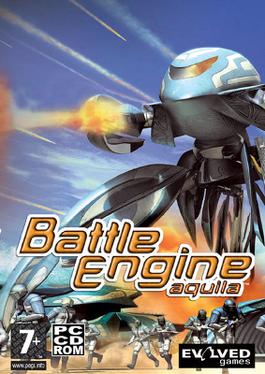
Battle Engine Aquila is a 2003 video game for PlayStation 2 and Xbox developed by Lost Toys and published by Infogrames Europe. In the game the player pilots the Battle Engine for the Forseti military in their wars against the Muspell to decide who will rule what's left of the world. Battle Engine Aquila received little attention from the public despite overall good reviews from critics. It was listed as #86 in the Top 100 Games for PlayStation 2 by IGN. A later Microsoft Windows port was published by Encore Software.
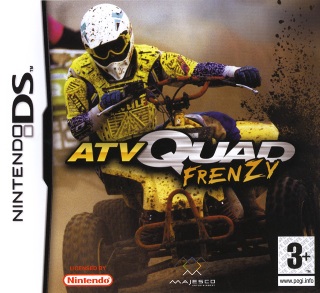
ATV: Quad Frenzy is a 2005 racing video game developed for the Nintendo DS by Skyworks Technologies and published by Majesco Entertainment. It was released for the Nintendo DS handheld games console on November 14, 2005 in North America, on June 16, 2006 in Europe and on October 25, 2007 in Australia. ATV: Quad Frenzy features five different game modes, which all center around ATV racing which takes place in various environments. Reviews of the game were critical; the game garnered only a 35% aggregated score from Metacritic.
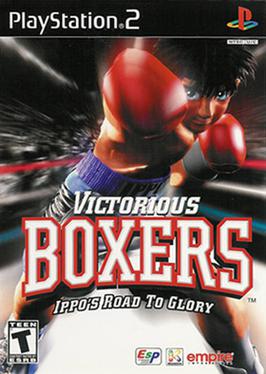
Victorious Boxers: Ippo's Road to Glory, known as simply Victorious Boxers, is a boxing video game developed by New Corporation for the PlayStation 2 video game console. It is based on the Hajime no Ippo franchise. The game was released in Japan by Entertainment Software Publishing in December 2000 and in North America and Europe by Empire Interactive in 2001.

Mobile Suit Gundam: Gundam vs. Zeta Gundam is a third-person shooter published in 2004 for PlayStation 2 and GameCube. It takes place seven years after the One Year War Gundam storyline. The game includes 31 mobile suits which can be played in five different modes: Arcade, Versus, Universal Century, Survival, and Training.

Commandos 3: Destination Berlin is a real-time tactics video game and the third installment of the Commandos series. It was developed by Pyro Studios and published by Eidos Interactive in October 2003 for Windows, with a Mac OS X port releasing in June 2005 via publisher Feral Interactive. The game is the first in the series to use a true 3D engine as well as introduce deathmatch multiplayer mode.
Emergency is a series of real-time strategy simulation video games by German developer Sixteen Tons Entertainment, designed by Ralph Stock. In the games, players control emergency services—namely police, fire, emergency medical services, and technical services—and command operations to handle a variety of emergencies.

Call of Duty: World at War is a 2008 first-person shooter game developed by Treyarch and published by Activision. It is the fifth main installment of the Call of Duty series and is the fourth entry in the series to be set during World War II. The game was announced by Activision in June 2008 and was released in November 2008, for PlayStation 3, Windows, Xbox 360, and Wii. Other games under the World at War title were published for the Nintendo DS and PlayStation 2, featuring different storylines and missions.
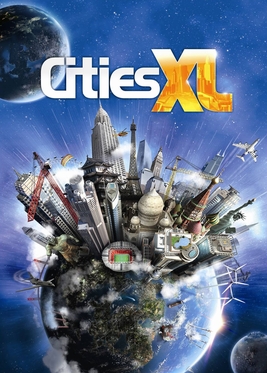
Cities XL is a city-building video game developed by Monte Cristo as a sequel to their earlier title City Life. It was originally scheduled for release in the first quarter of 2009, but was eventually released on October 8, 2009. The game allowed players to play online and interact with others on massive persistent planets, and to work together by trading resources or building blueprints in order to satisfy the needs of city inhabitants. However, on March 8, 2010 the online service was closed and the game became single-player only.

Matt Hazard: Blood Bath and Beyond is a downloadable video game for the PlayStation Network and Xbox Live Arcade. It is a sequel to Eat Lead: The Return of Matt Hazard.

Pure Pinball is a series of pinball simulation video games developed and published by Legendo Entertainment The single-player games feature several themed pinball tables, each with different mechanics and game modes. The game engines mimic the physics of real pinball machines. The player can choose from several different camera angles to follow the gameplay.

Combat Mission is the name of a series of computer wargames simulating tactical battles. The series has progressed through two distinct game engines. The original game engine, referred to as 'CMx1' by the developer, Battlefront.com, powered a trio of games set in the Second World War. Combat Mission: Shock Force was released in July 2007 as the debut of the 'CMx2' game engine. The Combat Mission games are a mixture of turn-based gameplay and simultaneous real-time execution. The game environment is fully three-dimensional, with a "Wego" style of play wherein each player enters their orders into the computer simultaneously during pauses in the action, and then are powerless to intervene during the action phase. More familiar turn-based games use an "I-go/You-go" system of play.
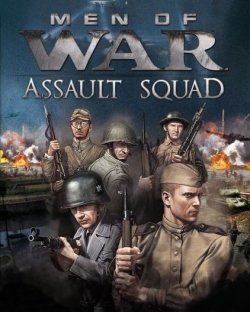
Men of War: Assault Squad is a game of real-time tactics strategy game set in World War II.

Worms Ultimate Mayhem is a 3D artillery turn-based tactics video game developed by Team17. The game is a re-release of Worms 4: Mayhem with improved graphics. It features all-new content, story mode voice acting by Guy Harris, and other gameplay fixes such as reworked camera controls. The game features turn-based gameplay, a single-player campaign, and both local and online multiplayer. While primarily based on Worms 4: Mayhem, Ultimate Mayhem also includes content from Worms 3D, with its campaign and multiplayer maps included in the game.

Badland 2 is a mobile video game designed by Frogmind Games and released on the iOS and Android platforms. The game was released in December 2015 on iOS and in September 2016 on Android. It is the sequel to Badland.


















